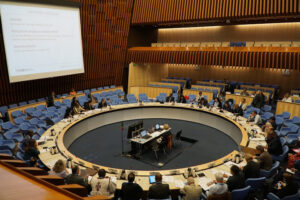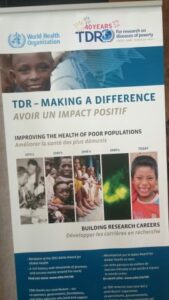The 44th TDR / WHO Joint Coordination Meeting (JCB) was held on June 16th and 17th. The following is a report from the participants, Professor Hirayama of Nagasaki University.
The Ministry of Health, Labor and Welfare, as a representative of Japan, has participated in JCB, a committee that supervises and makes recommendations on the operation of the Tropical Disease Research Human Resources Development Special (TDR) program , which has a history of 44 years, as a donor since its inception. I participated in the web with the assistant manager of the International Affairs Division.
The TDR Program was originally established as a WHO department specializing in research and education activities related to health and hygiene in line with WHO's objectives. Basically, it seems that it is well recognized especially in developing countries that it has continued that spirit for nearly 50 years and has made a great contribution to research on countermeasures against infectious diseases spreading in developing countries and human resource development. The actual activities are support for research projects and training of researchers. In Japan, funds such as scientific research grants and JSPS human resource development scholarships are allocated based on open recruitment. I think most researchers and leaders in developing countries have experience in conducting research activities with the assistance of TDR.
For the past 15 years or so, industry-academia-government collaboration has become mainstream, and the existence of NTDs, the London Declaration, the Bill Gates Foundation, GHIT, and other peers in this area has often become hazy. Perhaps because of this, the contributions of major countries have continued to decline, and in particular Japan has contributed 5 million yen this year, which is comparable to that of developing countries. This is a private reflection, but it seems that the cases where Japanese researchers support the principal investigators of developing countries and publish their papers as joint research have rarely been seen in the TDR project recently. I felt that was related to such a decrease in contributions. After the economic collapse in 2011, TDR has narrowed down the research target to access and is strengthening cooperation with UNDP / GHIT's Access Delivery Partnership (ADP) supported by the Japanese government. It may be realistic to strengthen it.
About 40 staff members work to maximize the effect with a publicly funded budget of 2 to 3 billion yen per year, and about 150 research papers and new health system models are published annually. Considering the progress of development and the development of researchers who contribute to the countermeasures against many poverty diseases (TB and NTDs), I felt that it was necessary to further strengthen the funding and soft power (research and education support) from Japan. .. For details, please see the annual activity report for 2020.
The photo shows the 40th WHO Headquarters Conference and 40th Anniversary Panel in 2016.



